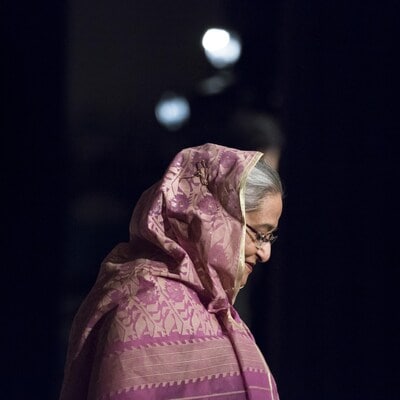)
Deposed Bangladesh Prime Minister Sheikh Hasina. Photo: Bloomberg
As demands for the extradition of deposed Bangladesh Prime Minister Sheikh Hasina from India intensify, four additional murder cases were filed against her, her former Cabinet ministers, and aides on Sunday.
According to a report by the state-run BSS news agency, a murder case was lodged on Sunday against 76-year-old Hasina, former director general of the Border Guard of Bangladesh, Gen Aziz Ahmed, and 11 others, in connection with the death of Abdur Rahim, an official of the then Bangladesh Rifles (BDR) in 2010.
Rahim, who served as the deputy assistant director of the BDR, was implicated in the case concerning the 2010 Pilkhana carnage. He died while in custody in July of the same year.
After accepting the petition, the relevant court instructed the police to take the plaintiff’s statement and register the complaint as a first information report (FIR).
Obaidul Quader, the Awami League general secretary and former road transport and bridges minister, and former home minister Asaduzzaman Khan are among the other accused in this case.
Additionally, a separate case was filed against Hasina and 27 others in connection with the killing of Md Eusuf Sanowar, a seller of Trading Corporation of Bangladesh products, in the capital during recent protests.
The concerned court directed the officer in charge of the Jatrabari police station to register the matter as an FIR.
The other accused in this case include Awami League general secretary Obaidul Quader and former ministers Anisul Huq and Tajul Islam.
As of Sunday, Hasina, who is the chairperson of the Awami League, was facing at least 53 cases, including 44 for murders, seven for crimes against humanity and genocide, one for abduction, and one for an attack on a Bangladesh Nationalist Party (BNP) procession.
Growing calls for Hasina’s extradition from India
The increasing number of cases against Hasina coincides with mounting calls for India to extradite her to Bangladesh.
On Monday, Jatiya Party Chairman Ghulam Muhammed Quader, who served as Leader of the Opposition in the previous Bangladesh Parliament, dissolved on August 6, stated that Hasina should be extradited from India and tried in a Bangladeshi court for all crimes committed by her and her regime.
In an interview with news agency PTI, Quader emphasised that while the people of both countries desire good relations, it is crucial to avoid acting as if one nation is the “supreme lord” and instead treat each other as equal partners.
Quader’s call for the former prime minister’s extradition follows the interim government’s decision last week to revoke all diplomatic passports issued to Members of Parliament from Hasina’s era, including the former prime minister’s passport.
Diplomatic passports grant privileges such as visa-free travel to certain countries.
The Home Department’s announcement marked a significant shift in Bangladesh’s diplomatic and political landscape.
Additionally, last week, BNP Secretary-General Mirza Fakhrul Islam Alamgir urged India to extradite Hasina so she could face trial, accusing her of plotting to undermine the country’s revolution.
“It is our call to you that you should hand her over to the government of Bangladesh in a legal way. The people of this country have given the decision for her trial. Let her face that trial,” Fakhrul was quoted as saying by the Daily Star newspaper.
Fakhrul further alleged that India appears to be reneging on its commitment to democracy by providing Hasina with shelter, claiming that “while staying there, she has initiated various plots to thwart the revolution that has taken place in Bangladesh.”
Hasina resigned and fled from Dhaka to India on August 5, following an unprecedented student-led anti-government protest against her administration. The protest had been initially sparked by a controversial quota system in government jobs.
Hasina’s prolonged stay in India could pose diplomatic challenges as Bangladesh escalates its calls for her extradition. Although Dhaka has not yet made a formal extradition request, the situation could strain bilateral relations.
Hasina’s ousted government was succeeded by an interim administration, with 84-year-old Nobel laureate Muhammad Yunus appointed as its chief adviser.
Since the fall of Hasina’s government, over 230 people have been killed in Bangladesh in the ensuing violence, bringing the total death toll to more than 600 since the large-scale student protests began in mid-July.
First Published: Aug 26 2024 | 1:40 PM IST
